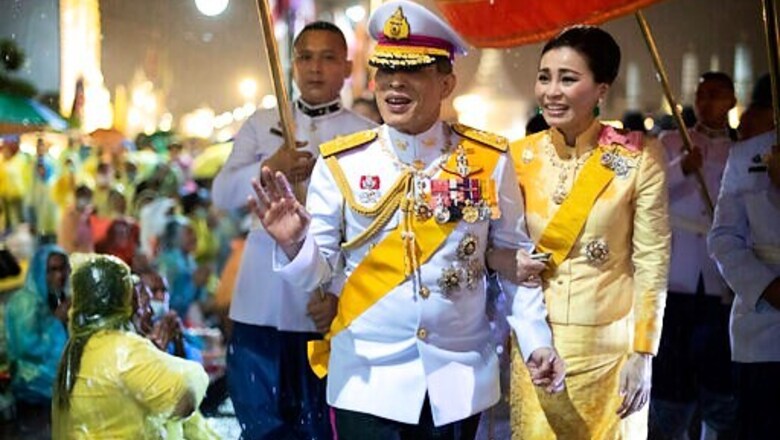
views
BANGKOK: Thai activists hoping to keep up the momentum in their campaign for democratic change launched a third major rally in Bangkok on Wednesday, amid concerns about a possible confrontation with police or rival groups supporting the government.
Despite a massive security presence and harassment from counter-demonstrators, thousands of protesters proceeded with a planned march from Bangkok’s Democracy Monument toward Government House, the offices of Prime Minister Prayuth Chan-ocha. Prime minister, get out! they chanted.
Before leaving Democracy Monument, several small clashes broke out between protesters and their opponents, who traded punches and threw plastic bottles as police tried to keep them apart.
There was speculation that the counter-protesters were organized by the authorities, with videos on social media showing municipal trucks carrying groups to the site.
The protesters negotiated their way past two police checkpoints but were blocked at a third, and it was unclear what they would do next.
The protesters announced plan is to surround Government House for at least a night.
The protest got off to a rocky start after organizers issued a post-midnight call for followers to begin assembling at Democracy Monument at 8 a.m. to assure they could secure the venue for the rally’s scheduled 2 p.m. start.
The area was blanketed with police, stationed in an organized manner but wearing yellow sports shirts instead of standard uniforms. Yellow shirts are a symbol of devotion to the monarchy, and are strongly associated with conservative politics.
The situation had already been complicated by King Maha Vajiralongkorns duties, which include a scheduled drive past the protest venue to attend a royal ceremony. The protesters said they would make way but there was a possibility that they could at a minimum show public disrespect for the crown. It was not clear whether they were still on the kings route after their march.
The king made a similar drive past the area on Tuesday after police cleared tents set up near the monument and arrested 21 people on minor charges.
Historically, attempts to bring democratic reform to Thailand have eventually been reversed by military coups.
We have to fight, said university student Kanokwan Kawkaew, 20. If we dont fight, we will lose again.
Wednesday’s protest was held on the anniversary of a key date in a 1973 popular uprising that led to the toppling of a military dictatorship.
The crowds at the previous two rallies, held on weekends, were significant, with an estimated 20,000 people attending a Sept. 19 event. But turnout appeared to be lower for this rally, launched on a weekday amid daily rain. Deputy police spokesman Col. Kissana Phathanacharoen estimated the crowd at 5,500 at 4:30 p.m.
The protesters have drawn attention because of their demands for reforms to Thailands constitutional monarchy, which they claim does not properly operate in a democratic framework.
That demand has caused a huge controversy, because the royal institution has long been considered sacrosanct and a pillar of Thai identity. It is also protected by a lese majeste law that mandates three to 15 years in prison for defaming the monarchy.
Conservative royalist Thais accuse them of seeking to end the monarchy, an allegation they deny.
Several royalist groups efforts to counter the previous rallies fell flat, but the turnout of counter-demonstrators was much larger Wednesday.
The protest movement was launched in March by university students but quickly put on hold as Thailand was gripped by surges in coronavirus cases. It came back in July, when the threat from the virus eased, and since then has again been spearheaded by students and publicized on social media.
The movements original core demands were new elections, changes in the constitution to make it more democratic, and an end to intimidation of activists.
The protesters charge that Prime Minister Prayuth, who as army commander led a 2014 coup that toppled an elected government, was returned to power unfairly in last years general election because the laws had been changed to favor a pro-military party. Protesters say a constitution promulgated under military rule is undemocratic.
Disclaimer: This post has been auto-published from an agency feed without any modifications to the text and has not been reviewed by an editor
Read all the Latest News and Breaking News here




















Comments
0 comment